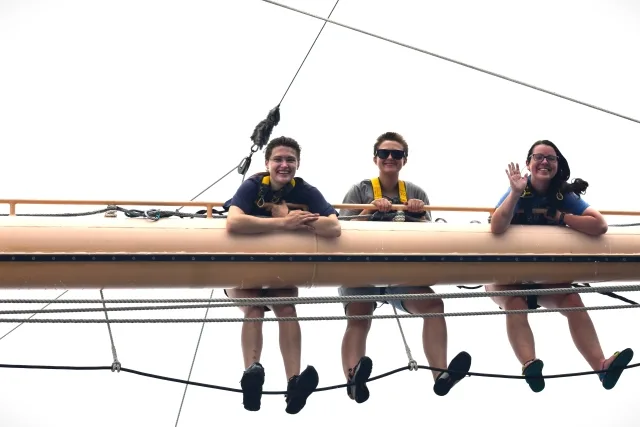Programs Blog
Science at Sea

Ali Fox, C Watch, Kenyon College
Ship’s Log
Noon Position
2°4.1’ N, 129°21.2’W
Ship Heading
218°
Taffrail Log
2430 nm
Ship Speed
9.5 knots
Weather
C/O 205°PSC. Wind SSE F4
Description of location
124 nm N of the equator!
Sail Plan
Sailing on a port tack under the 4 lowers with a shallow reef in the main. ME turning 1300 RPM.
Up until this morning, I had no idea what I wanted the topic of this post to be. But in my non-boat life, I’ve spent a lot of time working in labs, so as I sat on the floor of the wet lab today to pour a liter of seawater from a graduated cylinder into a bottle, I started thinking about how lab work at sea differs from that on land, in fun, frustrating, and comical ways.
So without further ado, here is my working, non-exhaustive list of some differences I’ve seen so far:
1: Cool deployments!
This is one of the biggest differences of lab work at sea for me: so much of it goes into gathering our own samples. This morning, we deployed a CTD carousel. The CTD senses conductivity, temperature, and depth as it goes into the water. The carousel around it has 12 bottles, which can be programmed to shut at particular depths, so we can collect seawater to analyze later. The carousel we deployed today went down to 150 meters. But a week ago, we sent a free CTD (just the CTD with no bottles attached) all the way down to 3000 meters. It took about an hour and a half just to lower it.
Luckily, we had the deployment Olympics to keep us busy (10 pushups or squats or whatever you choose for every 100 meters of depth – needless to say we were all sore the next day).
2: Pausing work at any given time to handle sails While we’re on watch, our group generally has about 5 people on deck and 4 in lab, but we’re all supposed to help keep the ship running. So we’re in the lab, doing whatever work needs to be done, but the rest of our watch might grab us to help move sails around if they need extra hands. Sometimes, this is an “as able” kind of request, like “we want to set this sail soon and come up to the quarterdeck when you’re at a stopping point”. Other times, it’s more immediate, like if a squall is coming in and we want to strike our sails quickly. But whatever it is, we need to be able to stow what we’re working on and get out there to help the deck crew keep the ship moving.
3: If it can slide, it will slide.
This, for me, is one of the biggest challenges of lab work at sea: everything moves! Including me! There have been a few times where I’ve been sitting at a microscope and my stool has just gone sliding across the room until I find something to grab onto (I’ve been getting better at this, but it’s still a work in progress). It also means always being mindful and keeping a hand on whatever I’m using if it’s not secured in a particular spot.
And that is why today, I found myself sitting crisscross apple sauce on the floor of the wet lab. It’s something I would never picture doing in a lab on land. Here, it just made sense. I was pouring a lot of liquid and I didn’t want to lose any of it, so I picked the most stable place to be: I sat down on the floor.
With 25ish days left of this trip, I’m sure I’ll have lots more to add to my list, but that’s all I’ve got for today!
Much love to everyone back at home,
- Ali Fox, C Watch, Kenyon College

Recent Posts from the Ships
- Ocean Classroom 2024-A collaborative high school program with Proctor Academy
- Collaborations and Long-term Commitments: SEA’s Caribbean Reef Program Sets a Course for Coastal Programs that Compliment Shipboard Experiences.
- Sea Education Association students prepare for life underway using state of the art nautical simulation from Wartsila Corporation.
- SEA Writer 2022, Magazines From the Summer SEA Quest Students
- Technology@SEA: Upgrades Allow Insight into Ocean Depths
Programs
- Gap Year
- Ocean Exploration
- High School
- Science at SEA
- SEA Expedition
- SEAScape
- Pre-College
- Proctor Ocean Classroom
- Protecting the Phoenix Islands
- SPICE
- Stanford@SEA
- Undergraduate
- Climate and Society
- Climate Change and Coastal Resilience
- Coral Reef Conservation
- Marine Biodiversity and Conservation
- MBL
- Ocean Exploration: Plastics
- Ocean Policy: Marine Protected Areas
- Oceans and Climate
- Pacific Reef Expedition
- The Global Ocean: Hawai'i
- The Global Ocean: New Zealand